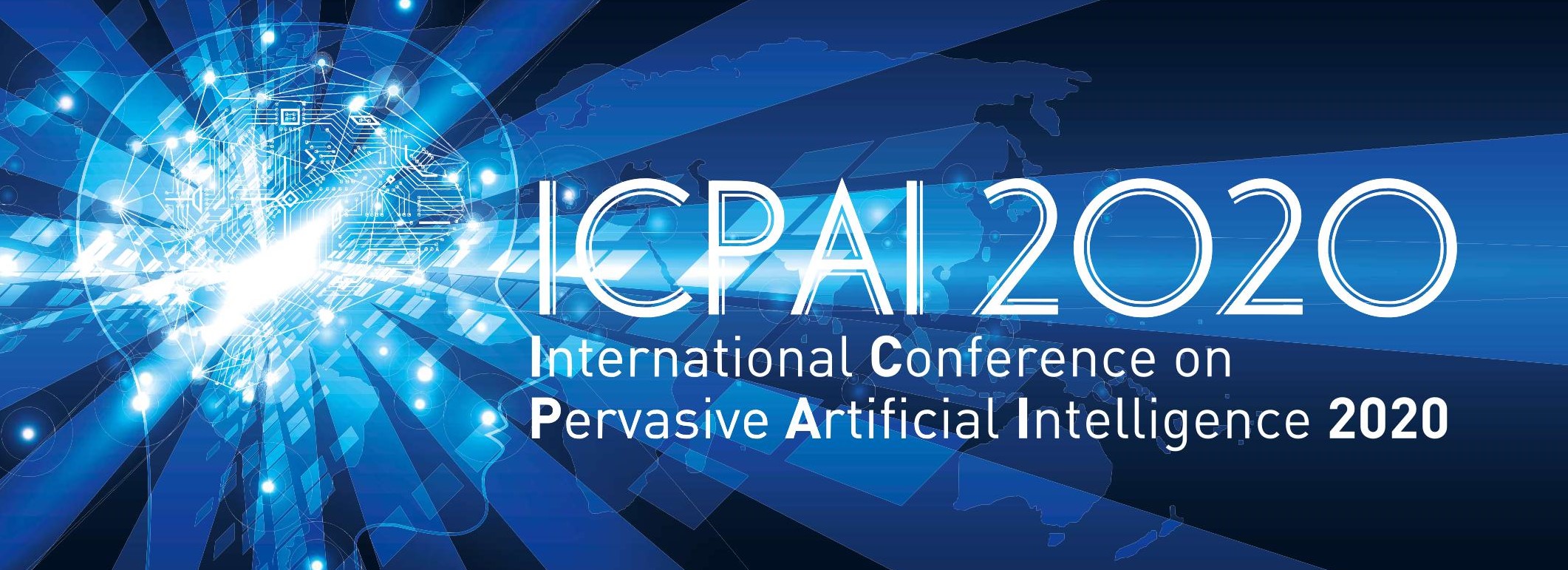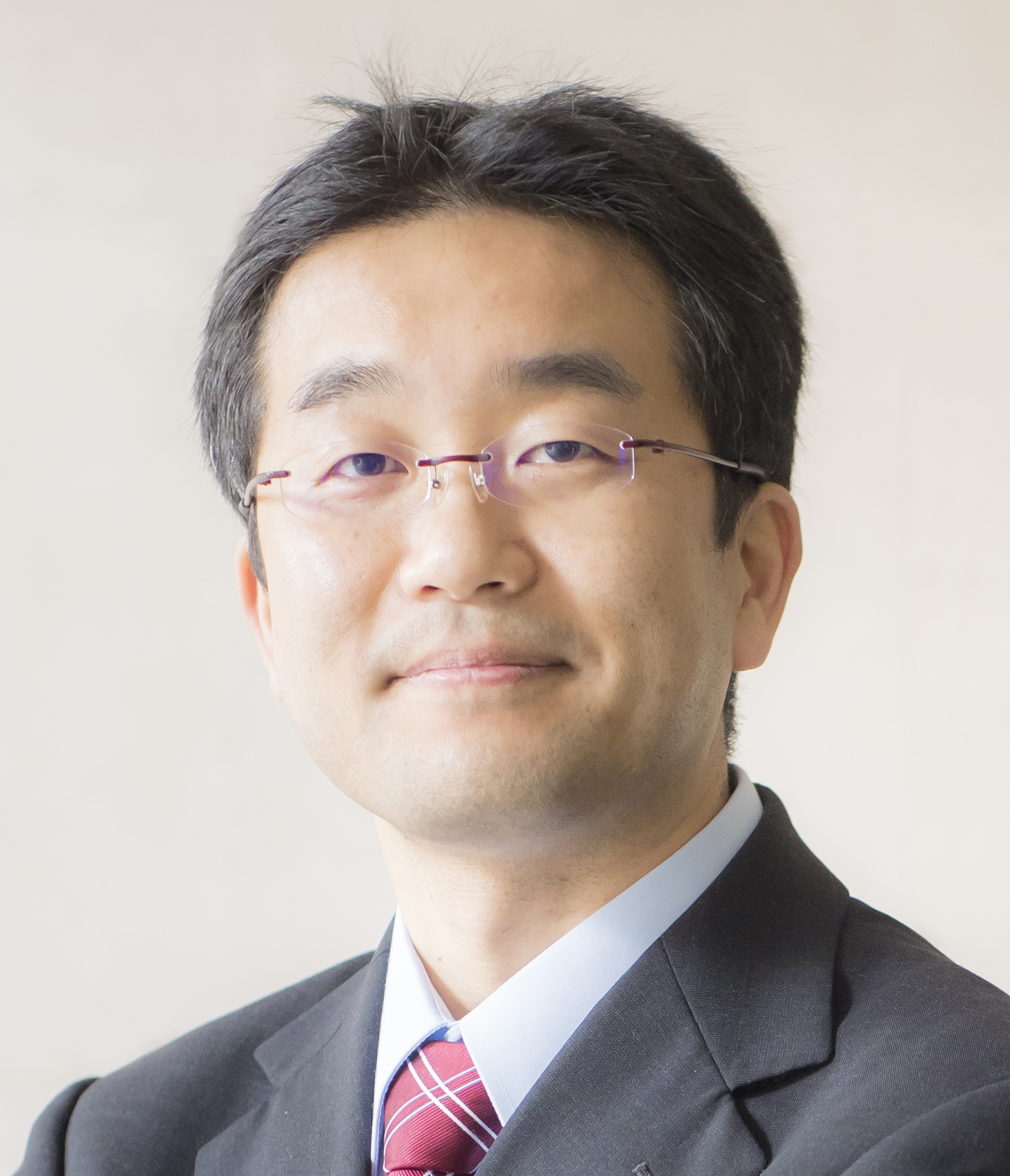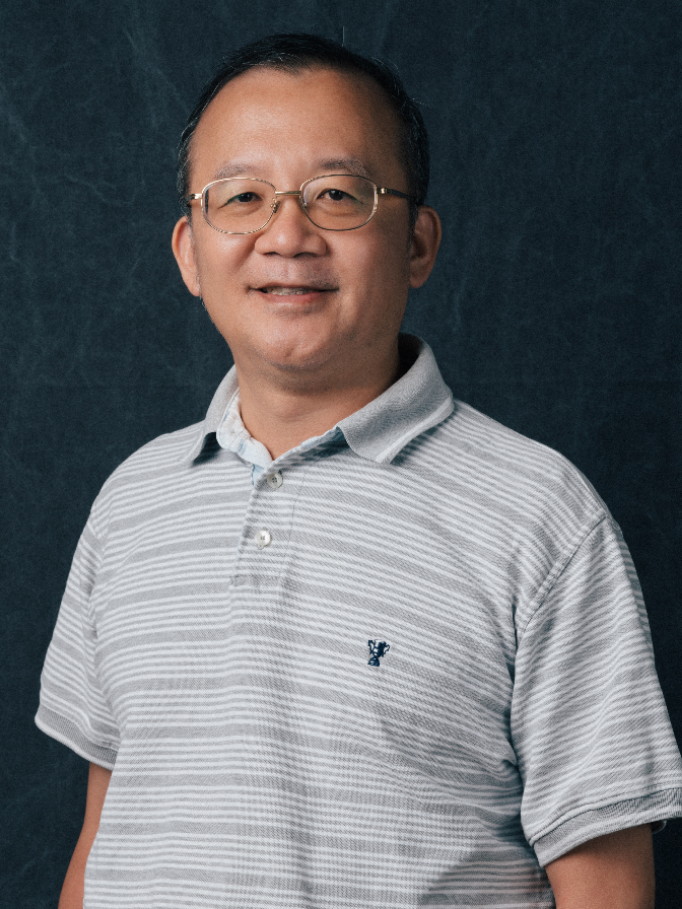

The International Conference on Pervasive Artificial Intelligence (ICPAI) is intended to serve
as a
cross-discipline and cross-domain annual meeting to promote the AI applications in various
fields. This
conference provides an excellent platform for academic researchers and industrial domain experts
to present,
discuss, and share their most recent findings in theoretical, technological, and
application-oriented
findings in all aspects of AI developments and applications.
The subjects of interest include, but are not limited to, medical diagnosis and prognosis,
manufacturing,
communications, robotics, smart city, urban mobility, social networks, business intelligence,
humanities,
law, social sciences, and human-machine co-evolving. It is not only a platform for AI knowledge
exchange and
sharing, but also a window for researchers and application engineers to continuously apply
pervasive AI
technologies on human society.
Year 2020 is the inauguration of ICPAI, initiated by Pervasive Artificial Intelligence Research
(PAIR) labs
and lots of AI professionals around the Taiwanese research community, with cooperation from
Japan, China and
Singapore experts. It is open to international participants, including researchers, students,
and industry
practitioners, in all domains who are interested in applied AI technologies.
The conference will cover a wide range of AI application research topics, including but not
limited to, the following key themes:

ICPAI 2020 PDF
title: Enhancing Stock Trend Prediction Models by Mining Relational Graphs of Stock Prices
authors: Hung-Yang Li, Vincent S. Tseng, Philip S. Yu
title: Comparisons of Energy Loss Reduction by Phase Balancing in Unbalance Distribution Networks via Metaheuristic Algorithms
authors: Wei-Tzer Huang, Wei-Chen Lin, Hsin-Ching Chih, Kai-Chao Yao, Zong-Tai Li, Chun-Chiang Ma
title: SlowFast-GCN: A Novel Skeleton-Based Action Recognition Framework
authors: Cheng-Hung Lin, Po-Yung Chou, Cheng-Hsien Lin, Min-Yen Tsai
title: A Machine Learning-Based Countermovement Performance Measurement Method Using a Wearable IMU
authors: Yi-Yu Chiang, Wen-Yueh Shih, Wei-Han Chen, Jiun-Long Huang, Tzyy-Yuang Shiang
title: Enhancing Stock Trend Prediction Models by Mining Relational Graphs of Stock Prices
authors: Hung-Yang Li, Vincent S. Tseng, Philip S. Yu
| Time | Discription |
|---|---|
| [2020/08/25] | Paper submission deadline has been extended until Sept. 15, 2020. |
| [2020/05/21] | The ICPAI 2020 official website is online. |
As the COVID-19 pandemic has subsided in Taiwan and been brought under control, we will hold physical meetings. However, we will also prepare online meetings for participants who cannot attend in person.
You can click here to get more information about Conference Schedule
Extended Paper Submission Due: August 31, 2020 Sept. 15, 2020
Notification: 14 Oct 2020 (Pacific Time).
Camera-ready and Registration: 20 Oct 2020 (Pacific Time).
*All deadlines are 11:59pm Pacific Standard Time (PST)
Registration fees is charged in New Taiwan Dollars (NTD).There are four types of registration program.
The full registration includes all benefits of ICPAI and TAAI 2020 program, i.e., accesses to all ICPAI 2020 and TAAI 2020 parallel sessions, keynote speeches, industrial panel sessions, welcome reception on 12/3, and banquet on 12/4.
| Early-Bird(Before 2020-10-31) | Regular registration (onsite)2020-10-31 ~ 2020-11-23 | |
|---|---|---|
| (TAAI/JSAI Member) | 10000 NTD | 12000 NTD |
| (Non Member) | 12000 NTD | 14000 NTD |
Available for non-author visitors with a permanent address in Taiwan. The program includes accesses to all ICPAI 2020 and TAAI 2020 parallel sessions, keynote speeches, industrial panel sessions, and welcome reception on 12/3.
| Early-Bird(Before 2020-10-31) | Regular registration (onsite)2020-10-31 ~ 2020-11-23 | |
|---|---|---|
| (TAAI/JSAI Member) | 5000 NTD | 6000 NTD |
| (Non Member) | 7000 NTD | 8000 NTD |
Available for visitors with a valid student ID. The program benefits include accesses to all ICPAI 2020 and TAAI 2020 parallel sessions, keynote speeches, industrial panel sessions, and welcome reception on 12/3.
| Early-Bird(Before 2020-10-31) | Regular registration (onsite)2020-10-31 ~ 2020-11-23 | |
|---|---|---|
| (TAAI/JSAI Member) | 2000 NTD | 3000 NTD |
| (Non Member) | 3000 NTD | 4000 NTD |
Due to COVID-19, we also offer the online program for visitors who cannot join the conference onsite. The program benefits include online accesses to all ICPAI 2020 conference sessions and TAAI 2020 international sessions, keynote speeches, and industrial panel sessions. For international authors who have difficulty to travel and cannot present their papers onsite, may also take the advantage of this program.
| Regular registration (online) | |
|---|---|
| (TAAI/JSAI Member) | 7200 NTD |
| (Non Member) | 8400 NTD |
Do you want to build valuable connections with top research institutes? Do you want to attract the best researchers to work with you? Take advantage of the ICPAI 2020 and gain valuable exposure for your corporate name. Check out our sponsorship program here (link to sponsorship program page) and become a sponsor.
We are also pleased to discuss customized sponsorship and recognition opportunities that meet your individual needs. Please contact pochihu@nctu.edu.tw for more information.
Yu-Chee Tseng, National Chiao Tung University, Taiwan
Yennun Huang, Academia Sinica, Taiwan
Vincent S. Tseng, National Chiao Tung University, Taiwan
Gary G. Yen, Oklahoma State University, USA
Zhi-Hua Zhou, Nanjing University, China
Yuh-Jye Lee, Academia Sinica, Taiwan
Hsing-Kuo Kenneth Pao, National Taiwan University of Science and Technology, Taiwan
Fang-Jing Wu, TU Dortmund University, Germany
Chi-Hua Chen, Fuzhou University, China
Jiun-Long Huang, National Chiao Tung University, Taiwan
Philippe Fournier-Viger; Harbin Institute of Technology, China
Chun-Hao Chen, National Taipei University of Technology, Taiwan
Yusuke Nojima; Osaka Prefecture University, Japan
Jerry Chun-Wei Lin; Western Norway University of Applied Sciences,Norway
Po-hi Hu, PAIR Labs, National Chiao Tung University, Taiwan
Wade Chou, Artificial Intelligence for Intelligent Manufacturing Systems Research Center
Wei-Chao Chen, Inventec Corporation, Taiwan
Jen-Jee Chen, National Chiao Tung University, Taiwan
Track 1. AI and humanities, philosophy, law, and social impacts
Chair: Ming-Jen Lin, National Taiwan University
Track 2. AI for communications and networks
Chair: Li-Chun Wang, National Chiao Tung University
Track 3. AI for cybersecurity and deep fake
Chair: Pin-Yu Chen, IBM Thomas J. Watson Research Center, USA
Chair: Hung-Min Sun, National Tsing Hua University
Track 4. AI for health care and medical applications
Chair: Li-Chen Fu, National Taiwan University; MOST Joint Research Center for AI Technology and All Vista Healthcare
Track 5. AI for precision sports
Chair: Chih-Wei Yi, National Chiao Tung University
Chair: Mei-Yen Chen, National Taiwan Normal University
Chair: Tzyy-Yuang Shiang, National Taiwan Normal University
Track 6. Fintech and business intelligence
Chair: Tian Shyr Dai, National Chiao Tung University
Track 7. Intelligent Human-Computer Interaction
Chair: Liwei Chan, National Chiao Tung University
Track 8. Lessons from industry deployments of AI
Chair: Wade Chou, Artificial Intelligence for Intelligent Manufacturing Systems Research Center
Track 9. Robotics and autonomous driving
Chair: Chung-Hsien Kuo, National Taiwan University of Science and Technology
Track 10. Smart agriculture
Chair: Ming-Der Yang, National Chung Hsing University
Track 11. Smart architecture and intelligent buildings
Chair: June-Hao Hou, National Chiao Tung University
Track 12. Smart city and intelligent transportation systems
Chair: Jiun-In Guo, National Chiao Tung University
Track 13. Smart energy
Chair: Kuo-Lung Lian, National Taiwan University of Science and Technology
Track 14. Smart manufacturing
Chair: Tien-Fu Chen, National Chiao Tung University
Track 15. AI for Edge Computing
Chair: Chao-Tung Yang, Tunghai University
Lee, Yuh-Jye, Academia Sinica, Taiwan
Hsing-Kuo Kenneth Pao, National Taiwan University of Science and Technology, Taiwan
Fang-Jing Wu, TU Dortmund University, Germany.
Chi-Hua Chen, Fuzhou University, China

Recent Advances in Robust Machine Learning
In real-world machine learning applications, robustness to various factors such as sensor noise, human error, insufficient information, adversarial attack, changing environments, and sample selection bias is becoming increasingly important. In this talk, I will give an overview of our recent advances in robust machine learning, including noise transition estimation, noisy sample removal, weakly supervised classification, domain adaptation, distributionally robust learning, and classification with rejection.
Masashi Sugiyama received the PhD degree in Computer Science from Tokyo Institute of Technology in 2001. He has been a Professor at the University of Tokyo since 2014 and he has a concurrent appointment as the inaugural Director of RIKEN Center for Advanced Intelligence Project since 2016. He co-authored Machine Learning in Non-Stationary Environments (MIT Press, 2012), Density Ratio Estimation in Machine Learning (Cambridge University Press, 2012), Statistical Reinforcement Learning (Chapman and Hall, 2015), Introduction to Statistical Machine Learning (Morgan Kaufmann, 2015), and Variational Bayesian Learning Theory (Cambridge University Press, 2019). He served as a Program Co-chair for the Neural Information Processing Systems Conference in 2015 and for International Conference on Artificial Intelligence and Statistics in 2019. He received the Japan Academy Medal in 2017 for his series of contributions in machine learning.

How to achieve high-security identity verification with your face?
The use of face for biometric recognition has been more and more popular. Face provides very convenient and high-precision biometric information for identity recognition, including verification and identification. Face recognition is one of the widely used application areas that benefit from the deep learning technology in computer vision. However, there are many technical and legal issues arisen in recent years and need to be resolved urgently. In this talk, we will focus on the technical challenges for applying face recognition models to face login on computers and mobile phones as well as physical access control in practice. These challenges include face recognition under attribute variations, large pose variations, and occlusions, as well as the fairness issue and face anti-spoofing. In addition, I will also discuss the across-model face recognition problem which is commonly encountered in practical face recognition systems and the solution. Finally, I will conclude the talk with some potential research directions.
Shang-Hong Lai received the B.S. and M.S. degrees from National Tsing Hua University (NTHU), Taiwan and the Ph.D. degree from University of Florida, Gainesville, USA. He joined Siemens Corporate Research in Princeton, New Jersey, USA, as a member of technical staff in 1995. Since 1999, he joined the Department of Computer Science, National Tsing Hua University, Taiwan, where he has been a professor in the same department. He also served as the chairman of the department during 2015-2018/6. Since the summer of 2018, Dr. Lai has been on leave from NTHU to join Microsoft as a principal researcher in Microsoft AI R&D Center, Taiwan.
Dr. Lai’s research interests are mainly focused on computer vision, image processing, and machine learning. He has authored more than 200 papers published in refereed international journals and conferences in these areas. In addition, he has been awarded around 30 patents on his researches on computer vision. He has involved in the organization for a number of international conferences in computer vision and related areas, such as ICCV, ACCV, ICIP, etc. Furthermore, he has served as an associate editor for Pattern Recognition, Journal of Signal Processing Systems and IPSJ Transactions on Computer Vision and Applications, and a guest editor for Journal of Visual Communication and Image Representation

Professor, Center for Biomedical Informatics at Harvard Medical School and the Department of Electrical Engineering and Computer Science at the Massachusetts Institute of Technology (MIT) Director, Biomedical Cybernetics Laboratory
Prof. Gil Alterovitz is a faculty at Harvard Medical School specializing in biomedical
informatics and with the Computational Health Informatics Program at Boston Children's Hospital.
He is Director of the Biomedical Cybernetics Laboratory. He is also affiliated with the
Department of Electrical Engineering and Computer Science at the Massachusetts Institute of
Technology. He is co-chair of the HL7 Clinical Genomics workgroup and on the Clinical Workgroup
core executive group of the Global Alliance.
His research focuses on integrating genomics within healthcare settings as well as international
collaborations involving genomics/clinical data integration. His work on integrative methods for
“big data” in the biomedical informatics space has been published or presented in more than 30
peer-reviewed publications ranging from academic journals and international conferences to three
books (including “Systems Bioinformatics: An Engineering Case-based Approach,” ranked #1 in new
Amazon bioinformatics category). Prof. Gil Alterovitz’s web page is
HERE.

Deep Reinforcement Learning: from Games to Real World Applications
In this speech, I will focus on Deep Reinforcement Learning (DRL), one of the key AI technologies. Google’s DeepMind developed a Go program, AlphaGo, that defeat the Go champion, which was thought to be not possible to happen within one or two decades. First, review Deep Reinforcement Learning (DRL). Second, classify DRL applications into three types, from board games, video games, to industrial applications. Then, present the prospective researches on DRL in the three types of DRL applications.
I-Chen Wu is a Professor at Department of Computer Science, National Chiao Tung University. He received his B.S. in Electronic Engineering from National Taiwan University (NTU), M.S. in Computer Science from NTU, and Ph.D. in Computer Science from Carnegie-Mellon University, in 1982, 1984 and 1993, respectively.
Wu invented a new game, named Connect6, a variation of the five-in-a-row game, and presented this game in the 11th Advances in Computer Games Conference (ACG'11) in 2005. The game-tree complexity of this game is quite high, close to Chinese Chess. Since presented in 2005, Connect6 has been a tournament item in Computer Olympiad. He wrote a program, named NCTU6, and won the gold in the tournament in 2006. Up to date, there have been at least four game websites supporting this game, at least 10 web forums for this game (in Traditional Chinese, Simplified Chinese, English, Spanish and multi-lingual), hundreds of thousands games played over the Internet, several Josekis (opening moves) and Tsumegos (like puzzles) developed, and one human Connect6 open tournament held in Summer 2006.
Wu also developed a game platform over Internet and actively participated in software development leading a team to major software components and framework in both clients and servers. In the client side, the team led by him developed a portable AWT/Swing architecture for Java game development, which has been used in some game companies including Sina Inc., Hinet, and ThinkNewIdea Inc., in Taiwan. Prof. Wu's web page is HERE.
Dates:Dec 3-5, 2020
Location:Howard Civil Service International House Taipei No. 30, Hsin Sheng South Road Sec. 3, Taipei, Taiwan 106, R.O.C.
Reservation FormThe way to go to the hotel is by Taoyuan Airport Metro + Taxi. It takes 35 minutes to reach the Taipei main station by Taoyuan Metro. From Taipei main station, please take a taxi to the hotel (approx. fee 160-200 NT dollars). Or please take the Taipei Metro from Taipei main station(R10) to Chiang Kai-shek Memorial Hall (R08/G10), and change to Green line (Songshan-Xindan line) from G10 to G08 (Taipower Building). Take the Exit 2 , turn left and walk about 800 meters (10~15 minutes) to reach the intersection of Sinhai Road and Sinsheng S. Road, then turn left to arrive at Howard Civil Service International House.